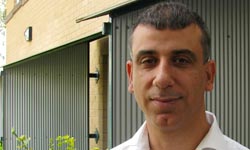Building bridges of dialogue and goodwill is a necessary activity for multi-faith societies according to an Islamic academic at Charles Sturt University (CSU).
 Associate
Professor Mehmet Ozalp is Director of the University's Centre for Islamic Studies and Civilisation
in Sydney. He lectures in theology, philosophy and history.
Associate
Professor Mehmet Ozalp is Director of the University's Centre for Islamic Studies and Civilisation
in Sydney. He lectures in theology, philosophy and history.
He recently joined with Catholic priest Father Patrick McInerney in Wagga Wagga to lead an interfaith community discussion entitled Building Bridges.
"Not a day passes when local and international events threaten the delicate harmony and fragile good-will in Australia and around the world," Professor Ozalp said.
"As someone involved in building bridges for more than 15 years, I would argue harmony building and dialogue construction is not a simple endeavour.
"There are enduring and formidable challenges facing architects, workers and supporters of dialogue and goodwill."
The CSU academic has identified six challenges and solutions:
- Challenge 1
The dual challenge of radicalisation and Islamophobia are two beasts that feed one another. Even though they are promoted by a minority of people, those people are loud and zealous.
We must see radicalisation and Islamophobia as two faces of the same problem. Moderates amongst us must be equally active and get our voices heard.
- Challenge 2
We are now seeing an acceptance of the argument of the radicals and Islamophobes in more subtle ways. Some moderate Muslims are saying 'Enough - why do we always need to condemn terrorism and violence?'. Some moderate Non-Muslim circles are saying 'Perhaps, ISIS or al-Qaida is a legitimate interpretation of Islam'.
- Challenge 3
The media's sensationalism of world events causes generalisations and dehumanisation throughout society.
We need to tirelessly engage media and insist on alternative voices. Utilise social media more effectively. Use our grass-roots power and repeat small events in massive numbers.
- Challenge 4
Criticism of people in our respective camps is demotivating. Further, missionary instincts show themselves as hidden agendas in dialogue initiatives damaging trust and relationships.
We must maintain our sincerity and engage in dialogue solely for the sake of God as a good act. It is possible to develop a theory and practice of bridge building, both in general and within our respective traditions.
- Challenge 5
Muslims do not have a historical precedent of living as minorities. Western societies do not have a historical experience of living together with a large population of Muslims.
The Western societies need to develop a theory and practice for a multi-faith society. Muslim minorities living in Western countries need to develop legal and theological interpretations to allow them to peacefully integrate and live amongst largely non-Muslim and secular society while maintaining their identity.
- Challenge 6
Dialogue initiatives and organisations involved in them are under-resourced and under-funded.
We must use what resources we have more efficiently by spending funds on projects rather than salaries and buildings. More people need to dedicate volunteer time. Organisations and government have to fund large scale harmony initiatives.
Professor Ozalp said, "There is a verse from the Qur'an for religious tolerance and acceptance:
"For each (community) have we appointed a clear way. And if God had so willed, He would surely have made you a single community; but (He willed it otherwise) in order to test you by what He granted to you. Strive, then, together as if competing in good works. To God is the return of all of you, and He will then make you understand (the truth) about what you have differed on." (Qur'an, 5:48)
Professor Ozalp said, "The bridges of dialogue and harmony we have worked so much to build must be maintained, at times repaired, but always made stronger and multiply in numbers. We can't just build bridges and leave it to fade away and collapse.
"We must also accept that this is a perpetual process and duty.
"In the process, we can become richer as individuals and as society."





Social
Explore the world of social